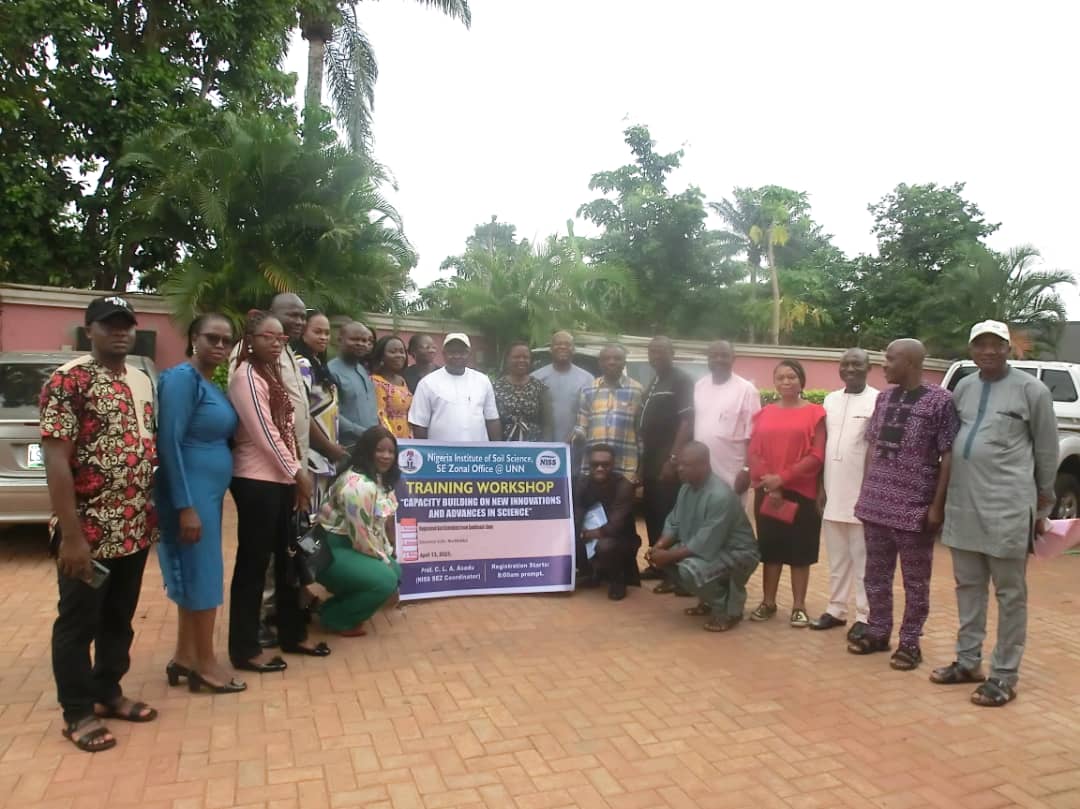NISS decries dearth of fertilizers to Nigeria farmers
By Ikechukwu Odu
NSUKKA —-The South East Zonal Coordinator, Nigeria Institute of Soil Scientists, NISS, and a Professor of Soil Science, University of Nigeria, Nsukka, UNN, Charles Asadu, has decried non-availability of fertilizers to Nigeria farmers.
The University lecturer who stated this in an interview with newsmen during a capacity-building workshop for Registered Soil Scientists on ‘New Innovations and Advances in Soil Science,’ at the Discovery Suite, Nru, Nsukka Local Government Area of Enugu state, also alleged that fertilizers are being diverted to markets where the prices are being inflated beyond the reach of farmers.
‘’Fertilizer non-availability has been a serious problem in Nigeria because of its distribution system. Unless our government can do something tactically to ensure effective distribution of the product to get to the farmers, the situation may remain the same,” he said.
Speaking on the theme of the workshop, the Coordinator said its main target was for the members to be acquainted with the current happenings in the area of soil science, and to ensure that they were not left out in the new information and technology order in the area.
‘’We are in a changing world and Soil Scientists cannot be left out. Farmers depend on them for improving their productive capacity and efficiency. NISS sees it as imperative to keep the registered soil scientists abreast with the new developments in their field. You have seen from the workshop lectures how enthusiastic the members were to get the fresh information on the improvements in the soil science.
‘’What we have done is to organize ourselves, the registered scientists to break the technical terms for easy understanding and application,” he said.
During a paper presentation entitled, ‘’Creation of Organic Amendments from Sustainable Plant Sources Using Eco-friendly Agricultural Technology,” by the Assistant Director, Farming System Research Programme, National Root Crops Research Institute, Umudike, Abia State, Onyekwere Nwokoma, said that the heaps of garbage, degradable dirt as well as domestic and industrial wastes that litter all over the country’s environment could be converted to organic amendments for soil fertility and healthy living through the use of eco-friendly agricultural technology.
According to him, organic amendments are fertilizers derived from organic sources, including organic compost, cattle manures, poultry droppings and domestic sewage, adding that eco-friendly agricultural technology, also referred to as clean technology uses green renewable energy to convert plant residues to organic amendments at zero carbon emission.
He added that eco-friendly technology could aid the preservation of the environment through energy efficiency and reduction of harmful wastes.
The Dean, Faculty of Agriculture, University of Nigeria Nsukka, Prof. Peter Ezeaku in his presentation titled, ‘’The Use of Machine Learning Techniques to Predict Soil Properties and Optimize Agricultural Productivity’’, noted that agricultural production output has continued to dwindle, particularly in Nigeria because farming is still being carried out manually as farmers are reluctant to adopt advanced technology in farming.
‘’Pressure on agriculture and the agricultural system is expected to increase due to exponential expansion of human population and climate variability. This necessitates the need for advanced research such as the use of machine learning technologies to boost agricultural productivity’’, he said.
In a goodwill message the Programme Manager, Enugu state Agricultural Development Programme, ADP, Dr. Ogbonna Onyeisi, appreciated the NISS for organizing the workshop, pointing out that if other institutions could follow their footsteps, agriculture would take its rightful position in the country.
The workshop attracted participants from different parts of the country; including Prof. Roseta Chizoba Eneje of Michael Okpara University of Agriculture, MOUAN, Umudike; Dr. Okore Ikokwu Kalu of the Nnamdi Azikiwe University, Awka; and others from the Institute’s headquarters, Abuja.
The highpoint of the workshop was the issuance of certificates to the participants.
-30-







